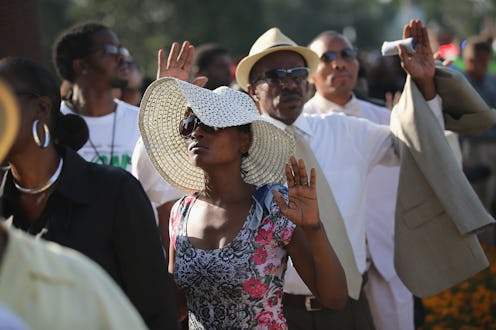News
Guests Are Doing This At Michael Brown's Funeral
Two weeks after he was fatally shot, family, friends, and supporters gathered on Monday for Michael Brown's funeral service, some raising their hands in "a don't shoot" sign to honor the unarmed teen. Reporters said the scene outside of the Friendly Temple Missionary Baptist Church in St. Louis was calm, a stark contrast to the violent protests that have ripped through Ferguson since Brown was shot by police officer Darren Wilson. On Sunday, Brown's father called for quiet at the funeral, which drew mourners from across the country.
As thousands of guests filed in, some had both hands up in the air in a gesture that has come to define the protests in wake of Brown's death. The international symbol of surrender has become one of the most powerful images to emerge from the streets of Ferguson, a telling sign of the police brutality and rampant racial inequality that Brown's death has brought to the forefront.
Though family members shared personal stories, the funeral inevitably tackled the larger social implications that Brown's death represented. Speakers brushed on the circumstances surrounding Brown's death, rather than solely reflecting on his life. Speakers referenced the 1896 landmark case Plessy v. Ferguson, which established a doctrine of separate but equal in the U.S. and the Dred Scott decision, which was made in Missouri. The legal cases were intended to underscore the idea of how the black community has been marginalized through U.S. history.
A slew of famous civil rights figures, celebrities, and activists showed their support, including Rev. Al Sharpton, Jesse Jackson Sr., Snoop Dogg, and Spike Lee. Rev. Sharpton spoke at the funeral, delivering a powerful message that delved in both matters of faith and civil rights.
"It is time to deal with policing. We are not the haters, we're the healers," Sharpton said to cheers, he later called for a fair investigation and legislative action.
Sharpton also addressed the power of the black community.
"Blackness was no matter how low we were pushed down, we rose up anyhow," he said, adding that having "ghetto pity parties" would not affect change within the community.
In closing, Sharpton called for action out of Brown's death.
The policies of this country cannot go unchallenged. We cannot have aggressive policing of low level crimes and can't deal with the higher-level ones...Some crazy kind of policing.
Thus far, crowds and protestors have respected the family's wishes to keep the peace and let the family mourn.
Images: Getty Images (4)\
